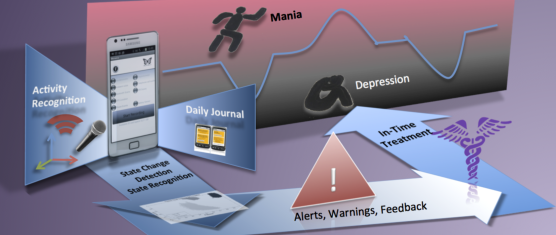A. Grünerbl, A. Muaremi, V. Osmani, G. Bahle, S. Öhler, G. Tröster, O. Mayora, C. Haring and P. Lukowicz

Today’s health care is difficult to imagine without the possibility to objectively measure various physiological parameters related to patients symptoms (from temperature through blood pressure to complex tomographic procedures). Psychiatric care remains a notable exception that heavily relies on patient interviews and self-assessment. This is due to the fact that mental illnesses manifest themselves mainly in the way patients behave throughout their daily life and, until recently there were no ”behavior measurement devices”. This is now changing with the progress in wearable activity recognition and sensor enabled smartphones.
In this article we introduce a system, which based on smartphone-sensing is able to recognize depressive and manic states and detect state changes of patients suffering from bipolar disorder.
The work is motivated by the fact that the effectiveness of bipolar disorder treatment critically depends on it being administered at the beginning of a patient’s transition into a different state (e.g. from normal to depressive). Once severe symptoms have persisted for a significant time, treatment is less effective and more difficult. At the same time, patients by themselves tend not to seek medical help until symptoms have become sever. Thus, being able to automatically recognize state transition with an unobtrusive sensor system holds the promise of significant therapeutic benefits.
We have verified our approach upon a real-life dataset of 10 patients, recorded over a time-period of 12 weeks (in total over 800 days of data tracing 17 state changes) by 4 different sensing modalities we could extract features corresponding to all disease-relevant aspects in behavior. Using these features we achieve recognition accuracies of 76% for specific states and state change detection precision and recall of over 97%.
